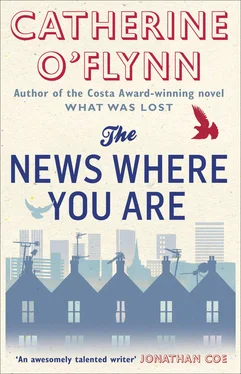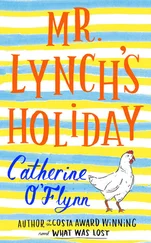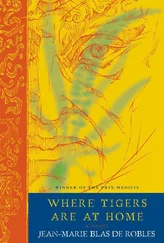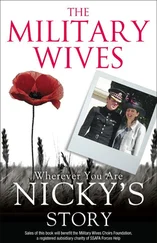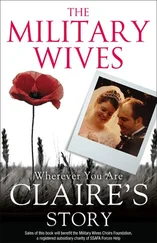‘Why not?’
‘Because after you die they demolish your buildings.’
‘That doesn’t happen to every architect,’ said Frank.
‘No, dear,’ added Maureen, ‘some are still alive when the demolition starts.’
He was having to pull over every few minutes to check the A — Z, then with the next few twists and turns committed to memory, he’d set off again, driving slowly through the heavy rain. Despite the downpour the windscreen wipers protested at every sweep, squawking as they dragged themselves with ill grace over the glass, a sound that had a special ability to jab at Frank’s nerves. He realized he was blinking in time to the wipers. He decided to pull over and walk.
The Hilltop estate was a compact sixties development on the very edge of the city. It was set, as its name rather overplayed, on an unremarkable bump in the landscape offering views back towards the city in one direction, and out to ploughed fields in the other. Due to some combination of the whims of its developers and the contours of the land the Hilltop estate had something of an experimental feel. As Frank had looked at the page of the A — Z, he saw the steady Euclidean geometry of the road network descend into a spaghetti of ellipses and ox-bows at Hilltop. It was no clearer off the page. Crescents bloomed from crescents in a tangled Mandelbrot soup.
With the street map in one hand and an umbrella in the other Frank set off to find 12 Lysander Avenue. At first it seemed as if the neat houses and maisonettes were not playing their part in Hilltop’s mission to disorientate. They were not the melting Gaudi confections that Frank thought would better complement the street design. It was only a matter of minutes, however, before their role became clear. Whilst every house had a number, they weren’t as far as Frank could tell in any discernible order. He found number 2 Lysander Avenue, which was followed by number 4 and number 6 creating a momentary illusion of a world in balance, before number 54 loomed up. After further increasingly damp investigation Frank discovered that number 54 belonged to Titania Close, which appeared not simply to intersect Lysander but to dismember it entirely, scattering the remains all over the estate. Frank eventually found number 12 embedded in the heart of Oberon Drive. A woman in a grey trouser suit, with long red hair, answered the door.
‘Mr Allcroft?’
‘Frank, please.’
‘Hello, Frank. I’m Rebecca — you spoke on the phone to my colleague Simi.’
‘Hi, Rebecca, I’m sorry I’m late. I couldn’t find the place.’
Rebecca frowned. ‘Did you not have the address?’
‘Yes, it’s just this place, you know; it’s a labyrinth …’ Frank laughed.
Rebecca looked at him blankly. ‘Well, it’s no problem anyway. I’m here all morning sorting through things. We really appreciate your offer to help — it could lead us to a relative.’
‘I’m glad to help. Hopefully this will jog my memory. I see a lot of faces in my work, but I usually remember them eventually.’
Rebecca nodded. ‘Okay, I’ve collected some stuff on the table in the living room there — have a look through. I need to get on and clear the rooms upstairs, if that’s all right.’
She turned and walked up the stairs, trailing the scent of some hair product Frank recognized from home. He left his dripping umbrella at the door and walked through to the living room. It was not as he had imagined. He realized that he had been expecting a scene of squalor. He had envisaged piles of mildewed newspapers, empty soup tins on the windowsills and mouse droppings in the kitchen. Instead the living room was sparsely furnished and spotless. A single high-backed orange armchair in front of a wall-mounted gas fire, a teak-effect dining table with two chairs, a matching side cabinet with what looked like a seventies-era music centre on top. He looked at the dustless smoked plastic lid of the record player. He thought of Michael Church diligently cleaning a house that would only be visited by strangers after his death. He thought that squalor would have been less sad.
On the table was a pile of paperwork. The woman from the council had said they’d found nothing there to indicate a next of kin. Frank sat carefully on the edge of a chair at the table and wondered what he was doing in this dead man’s house. The chances were that Michael Church had once featured in some news report and Frank would be able to add nothing new to his story. Perhaps Frank had interviewed him back when he was a reporter and all they would learn is that this man once had a lorry crash into his dining room, or had protested about a school closure, or been taken to court for cruelty to dogs.
He pulled the pile towards him and started sorting through the papers and envelopes. He touched the documents gently as if handling ancient relics. It was the usual tangle of paperwork built up over a lifetime. Policy booklets, TV-licence reminders, a letter of thanks for a recent donation. He had a fleeting memory of sitting at another table, many years ago, the afternoon sunlight pooling on the floor as he helped his mother sort through the policies and payment books left behind after his father’s death. He looked for Michael Church’s past addresses; he thought that place would be the key to his memory. Instead, in an A5 Manila envelope he found some photographs. A black and white one of a young woman sitting under a tree, the wind blowing her hair. The woman was laughing at whoever was taking the photo. Another one showed a couple of young men in army uniforms, neither appeared to be Michael. Another was in colour, a toddler, probably a boy, though it was hard to tell, holding a bucket and spade and looking delighted with himself. Another black and white one showed two young boys. The boy on the left was clearly Michael Church. He was wearing a tank top over a short-sleeved shirt and smiling shyly at the camera. The boy on the right was taller with an arm round Michael’s shoulder. His smile was wide and he seemed to have all the confidence that Michael lacked, his eyes looking straight through the lens. Frank had seen that look a hundred times. The boy was Phil Smethway.
Frank leaned back in the chair and closed his eyes. Now he remembered. It hadn’t been anything to do with a news story. It hadn’t even been that long ago, maybe eighteen months. Phil had been up in Birmingham on one of his visits and they’d arranged to meet for lunch. They were walking past St Philip’s Cathedral, heading down to the Jewellery Quarter when Phil called out to a man walking towards them. The man looked lost for a moment and then slowly broke into a smile as he recognized Phil. As he came towards them, Frank noticed his eyes — bright, big and blue and somehow too young for the rest of his face. Phil and the man shook hands vigorously, both laughing, and Phil introduced Michael to Frank as his ‘most longest, lostest, dearest pal’. Frank remembered how strong Michael’s grip was when he shook his hand. Michael said something about seeing Phil on telly and Phil was demanding to know why he’d never got in touch. Frank felt a bit of a spare part and so told Phil he’d go on ahead to the restaurant to get a table. He’d asked Michael if he’d join them, but he said he couldn’t. He left the two of them trying to work out how long it had been since they’d last met.
Frank looked again at the photo. He wondered if they’d stayed in contact after the chance encounter in the churchyard. He thought of the contrast in the way they had looked that day: Phil with his perma-tan, Rolex and white polo neck; Michael pale and slight in a cagoule. Michael didn’t look like the kind of person Phil had in his life; he didn’t look like he played golf or drove a Mercedes. Frank looked at the room around him and wondered if Phil ever discovered that Michael was living such a solitary existence. Michael must have heard of Phil’s death and yet Frank was sure he wasn’t at the funeral. He felt an itch to know more about Michael. To see if there was anyone alive who knew him and might give some clue as to who he was and how he ended up slipping out of life unnoticed. Frank could tell himself he was doing it as a favour to Phil.
Читать дальше
